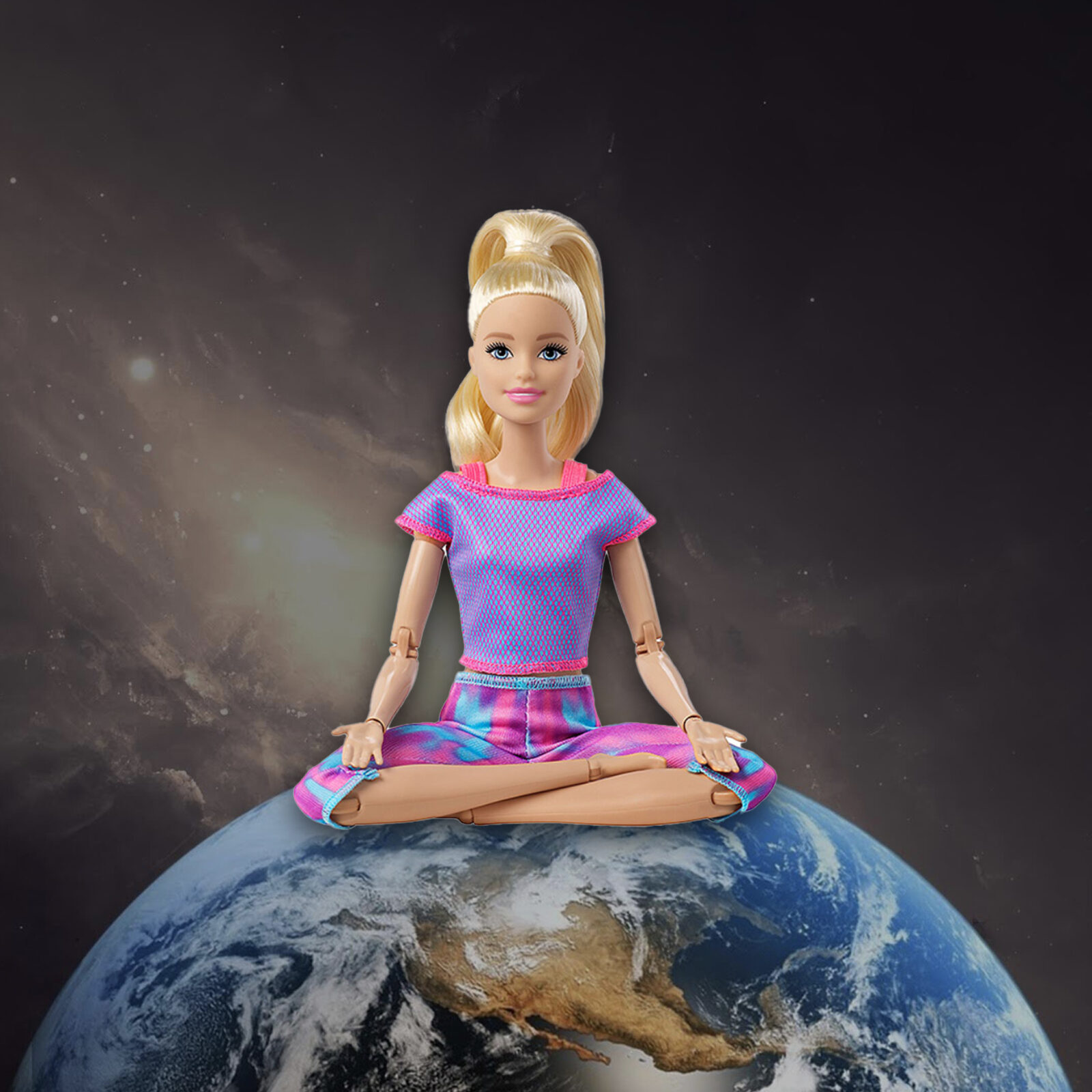Blog
I Love You Barbie
Oh, Barbie, my childhood rebellion. I love you.
Catholic schools were one of the original vestiges of learning about things like sex, drugs and rock-n-roll earlier than anywhere else. In the early sixties, the nuns had a Talibanisque view of women, believing they should be playing supportive roles in life instead of being the main attraction. That restrictive existence never worked for me. Anything they hated had to have been awesome. Because they despised Barbie, they stoked my deep affection for her.
Before Barbie came into my life, I had Dolly. Not the most creative name, but what do you want from a little kid? Dolly was the doll version of a paperweight. No fancy gimmicks, only my imagination to keep the play going. My mother’s sensibility of getting a bang for your buck rang true with Dolly because of her large size and ability to wear inexpensive baby clothes. Dolly did jack shit. Her eyes were always open, which was creepy, and I could only treat her like a baby because she was one. I recall asking for socks for Dolly because her toes were sharp due to a thin lip of plastic that ran the perimeter of her feet, untrimmed to the specificity of today’s toys, causing her toes to scratch me when we slept together.
I had no toys growing up except for paper, pencils, or clothespins, which I played with for hours, building ranches mimicking ‘Bonanza’ and ‘Gunsmoke.’ But then, in 1966, Barbie strutted into my life like a superstar diva. She was the holy grail of dolls—no feeding or babysitting required. In the swinging sixties, Barbie was a self-sufficient woman, blowing minds and what a wardrobe! Mini skirts and Go-Go boots, those white boots still haunt my dreams. You didn’t have to feed her or do anything. It was the sixties, and she was a self-made woman. While I had button-up shirts and my knees had to be entirely covered, Barbie rocked the mini and micro mini dresses like a boss. She was a modern icon, and I was a fan. Limitless toys meant limitless creativity, and Barbie became the superstar of my imaginative universe, going on wild adventures with her modern attitude. Clothespins can only take you so far, building only so many ranches. Barbie took me on adventure after adventure and introduced me to brunch and things my mother treasured, like gloves, high heels and hats. Barbie had manners and a busy schedule because she loved her life and was a kick-ass woman.
Upon Barbie’s arrival, I dropped Dolly quicker than a hot potato. Wiping a doll’s butt or feeding her a bottle gets old fast. Barbie embodied everything I wanted to be – a woman of independence, flair and fabulousness. When I finally got my hands on her, it was like Christmas and winning the lottery combined. She arrived in a shiny black round Barbie case. The most gorgeous Barbie in a Saturday Matinee outfit was inside when I unzipped it. I went to the matinees but in my sibling’s shoes, ugly pants and some weird-looking top. Not Barbie. She had a tweed two-piece pencil skirt suit with a fur jacket collar, gloves, a fur purse and brown open-toe heels. I couldn’t believe it. I treasured her like a precious gem. Move over baby pants. Barbie was taking over.
Barbie taught me you could be kind and possess self-actualization. She had a community of friends, and anything less than possible was unacceptable. Impossible was not in her vocabulary. You didn’t have to marry, which was good as her taste in guys I thought was her only weakness, but that’s my take. She showed me that there was more to aspire to than being a secretary. She gave me a voice in a house and world where boys were hailed as the second coming of Christ while girls watched from the sidelines. Sadly today, there are some cultures where women are still considered second-class citizens, which is beyond absurd in the 21st century.
Barbie became my superhero, my hope as a first-generation Canadian with little to my name. She embodied possibility – she could be anything, go anywhere, and party in style. She lived on the other side of a belief system I so wanted. I didn’t look anything like her, and I didn’t think to want to look like her. Barbie was an extension of my sensibility. Dolly wasn’t independent; Barbie was. She had a life, and it was fabulous.
I quickly handed Dolly to my mother, never looking back. There was no goodbye; thanks for the memories, nothing. Only a “here you go. I’m done.” I played with Barbie until I outgrew her. Over the years, I pulled some outfits out of my mother from the local Woolworths, which required Kissinger-level negotiations so I could continue with my necessary Barbie adventures. There weren’t knapsacks back then, but my mother bought me a purse for Sunday mass, and I’d stuff Barbie into it, pressed tightly against my prayer book to show her how the others lived who didn’t have the exciting adventures she did. Sitting through a high mass seemed easier, with Barbie in my purse beside me. Once I outgrew her, I passed her gorgeous outfits and the amazing round Barbie case to my youngest cousin, who was on her own Barbie journey and enjoyed it as much as I did.
I didn’t feel any pressure to be Barbie. Barbie was Barbie, and I was me; I liked myself growing up. It was my circumstances at the time I wasn’t a fan of. Barbie helped my imagination to see the possibilities that Dolly couldn’t and the nuns wouldn’t share with us. Barbie travelled and could be anything. She was always celebrating and had the best clothes even to go to the movies. Barbie showed me all of life, particularly what was behind the curtain, which excited me.
When I gave our daughter her first Barbie, she reacted no differently from me. She welcomed her, but unlike me, she already knew she could be all that Barbie was. I showered her with Barbie clothes because they were so fuc*king cool. The lousy thing was losing a shoe or boot, and we almost always lost one shortly after buying an outfit, only for a vacuum to suck it up or for someone to step on it, resulting in it getting tossed.
Before I gave our daughter her Barbie, I researched Ruth Handler, the inventor of Barbie, Mattel’s most famous doll. In her memoir of 1994, she wrote, “My whole philosophy of Barbie was that through the doll, the little girl could be anything she wanted to be,” and she was right. I was an astronaut, a doctor, busy going to brunch or doing whatever I wouldn’t have otherwise imagined.
Critics nitpick about Barbie’s body shape and how she couldn’t menstruate due to a lack of fat. Really? She’s a doll! As kids, we didn’t care about the backstory. Why do toys have to become a battleground for adult drama? Mighty Mouse was accused of being a cokehead, Teletubbies had a scandal, Dora the Explorer had her share of issues and even good ole Winnie the Pooh wasn’t so innocent in being banned in China. Why can’t we let kids have fun and embrace the wild imagination these toys spark? If we take offence, we teach our kids to do the same, enveloping them with stories and problems based on others’ fears and judgements that have nothing to do with play. It’s a doll that, for me, was about independence. That’s it, full stop. Barbie was about autonomy, power, resilience and unbridled imagination in a world just waking up to the power of women. For a kid from immigrants, that’s magical. She rocked a portfolio of clothing and cool accessories, fueling our playtime fantasies.
The nuns at school didn’t allow us to bring our Barbies to recess. They feared the liberation and possibility Barbie represented could provoke talkback during a time corporal punishment was alive and well. Can you spell Mary Magdelene? Barbie symbolized freedom, breaking boundaries with her diverse and fabulous friends and expanding our adventures beyond what the nuns deemed acceptable.
I didn’t know or care where Barbie came from as a kid. She arrived with a boatload of possibilities that allowed me to spend the entire day entertaining myself, and for that, I was grateful. The story behind the creator, Ruth Handler, is also filled with adventures, not all happy. Various issues, including her health, marred her long road to success.
In a time when toys were far from today’s high-tech wonders, Barbie was my beacon of hope—showing me a world beyond my wildest dreams. She was my inspiration to dare and dream limitlessly. She was a catalyst of imagination expressed in a community of kindness.
Ultimately, Barbie showed me that she was whole and complete and that life is precious and a fantastic adventure waiting to be lived. She never said it was easy. She only conveyed that it was worth it.


Love this!